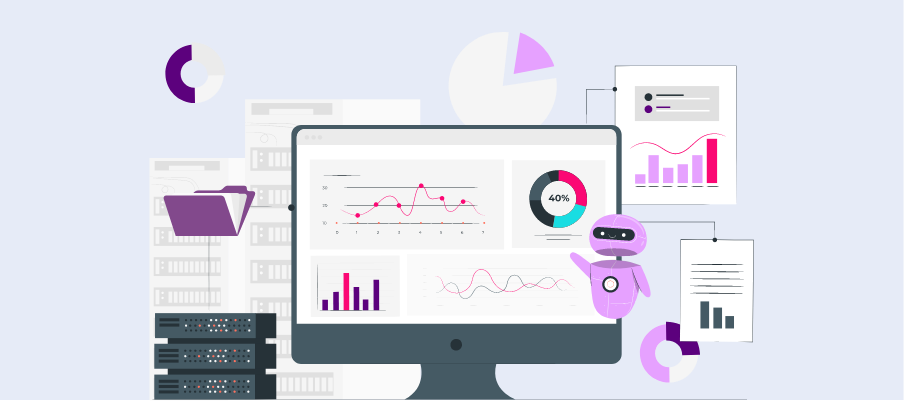Real-Time Data Tracking: Continuous updates on income and expenses for accurate financial oversight.
Why Every Small Business Should Invest in Automated Bookkeeping in 2025

Did you know that poor cash flow management causes 82% of small business failures? This alarming statistic underscores one of the biggest challenges small business owners face. Managing finances manually is time-consuming, error-prone, and increasingly ill-suited for today’s fast-paced business environment.
Enter automated bookkeeping. What used to be a luxury for large enterprises is now an essential tool for small businesses aiming to improve efficiency and stay competitive. By 2025, with the rapid adoption of digital tools and automation, small business owners who invest in automated bookkeeping will have a clear edge over those sticking to outdated methods.
This blog explores why automated bookkeeping is no longer optional and how it can completely transform how small businesses manage their finances.
What is Automated Bookkeeping?
Automated bookkeeping uses advanced software to handle repetitive accounting tasks, such as tracking expenses, categorizing transactions, and generating financial reports—in real-time.
Key Features to Look Out For
Expense Categorization: Automatically organizes transactions to reduce manual work.
Seamless Integration: Connects with tools like payroll systems, invoicing software, and tax platforms.
Why Automated Bookkeeping is Essential in 2025
The Changing Business Landscape
From remote work becoming the norm to the digital transformation of industries, the way businesses operate has drastically evolved. With increased competition, small businesses must work smarter to thrive.
How Automation Helps:
Automates repetitive tasks, allowing owners to focus on growth.
Adapts to remote workflows with cloud-based solutions accessible anytime, anywhere.
The Rising Costs of Manual Bookkeeping
Relying on manual methods is costly and inefficient. On average, small businesses spend nearly 120 hours a year managing their books—a process prone to errors that lead to financial setbacks.
Example: One study shows that small businesses can save up to 50% in bookkeeping costs by switching to automated tools.
Regulatory Compliance and Accuracy
With tax laws and financial regulations continuing to evolve, staying compliant is critical. Automated tools ensure proper tracking, real-time tax calculations, and error reductions—saving small businesses from hefty penalties. The IRS frequently updates compliance guidelines, making it crucial for businesses to stay current. Tools that integrate with IRS standards can reduce audit risk.
Benefits of Automated Bookkeeping for Small Businesses
Automated bookkeeping offers small businesses a seamless way to manage their finances while saving time and reducing errors. By incorporating technology into financial workflows, small business owners can focus more on growth and strategy, rather than getting caught up in tedious manual financial tasks. These tools not only enhance accuracy but also provide insights that support better decision-making.
Time Savings: Automated systems handle repetitive tasks like data entry, invoice processing, and reconciliation, allowing businesses to reclaim valuable hours for core operations.
Reduced Human Error: By minimizing manual input, automation ensures greater accuracy and reduces the risk of costly mistakes in financial records.
Improved Cash Flow Management: Many automated tools offer real-time tracking of expenses and revenues, helping businesses gain better visibility into their cash flow and make informed financial decisions.
Cost Effectiveness: While there is an initial investment in automation tools, the long-term savings in labor, error correction, and compliance penalties outweigh the upfront costs.
Scalability: Automated bookkeeping solutions can easily adapt to growing businesses, offering features and capabilities that scale as financial operations become more complex.
Data Security: Modern tools include robust security measures to protect sensitive financial data, ensuring peace of mind for business owners.
Easy Reporting: Automation simplifies the creation of financial reports, enabling businesses to access vital information quickly for analysis or presentations.
Challenges of Implementing Automated Bookkeeping (and How to Overcome Them)
Real-Life Success Stories
Here’s how automated bookkeeping has transformed small businesses like yours:
Case Study A
A Melbourne-based boutique store cut their bookkeeping time in half after adopting QuickBooks. They reported a 30% improvement in cash flow visibility.
Case Study B
A digital marketing agency in New York transitioned from spreadsheets to Xero. The result? Zero errors in tax filings and a $5,000 savings in annual accounting costs.
How to Get Started with Automated Bookkeeping in 2025
Getting started with automated bookkeeping in 2025 is simpler than ever, thanks to advancements in technology and user-friendly tools. Follow these steps to streamline your accounting process:
Assess Your Current Bookkeeping Needs
Begin by evaluating your existing bookkeeping workflows, identifying time-consuming tasks, and pinpointing areas prone to human error. This will help you understand which features you need in an automated solution.
Choose the Right Software
Research popular platforms like QuickBooks, Xero and Ziepie Fintech to determine which one aligns with your business size and industry. Many of these platforms offer free trials, allowing you to explore their functionalities before committing.
Set Up Your Account and Integrations
Once you've selected a platform, set up your account and connect it to your bank accounts, payment processors, or e-commerce platforms to automate data entry and reconciliation.
Learn the Basics with Tutorials
Most automated bookkeeping tools offer extensive resources, including tutorials, webinars, and customer support, to help you and your team get familiar with the software.
Monitor and Optimize
Regularly review your bookkeeping processes to ensure accuracy and efficiency. Many platforms provide insights that can help you further optimize your financial management over time.
By following these steps, small businesses can take full advantage of automated bookkeeping, freeing up time to focus on growth and strategy.
Future Trends in Automated Bookkeeping
The future of bookkeeping goes beyond basic automation, with emerging technologies set to revolutionize small business finance further.
Artificial Intelligence will refine predictive analytics, offering businesses better forecasting tools.
Machine Learning will help these systems improve with every transaction, reducing errors even further.
Blockchain Technology could enhance data security and make financial transactions more transparent.
By adopting automated bookkeeping now, small businesses position themselves ahead of the curve, ready to benefit from these advancements.
Frequently Asked Questions
What is the cost of automated bookkeeping software?
The cost of automated bookkeeping software can vary depending on the provider, but Ziepie offers its services at highly affordable rates designed to fit small business budgets. With transparent pricing and no hidden fees, Ziepie ensures that you receive top-quality financial management without breaking the bank.
Can automated bookkeeping replace an accountant?
While automated bookkeeping can handle repetitive tasks like data entry and generate accurate financial reports, it does not entirely replace an accountant. Accountants provide strategic insights, tax planning, and personalized advice that software alone cannot deliver.
Is automated bookkeeping secure?
Yes, automated bookkeeping is highly secure when using trusted platforms. These systems implement advanced encryption, regular security updates, and strict access controls to protect sensitive financial data. However, it is essential to choose reputable providers and follow best practices for password management and data security.
How long does it take to implement automated bookkeeping?
The time required to implement automated bookkeeping depends on the complexity of your financial processes and the platform you choose. For most businesses, the setup can be completed within a few hours to a few days. This includes integrating accounts, customizing settings, and learning the software.




